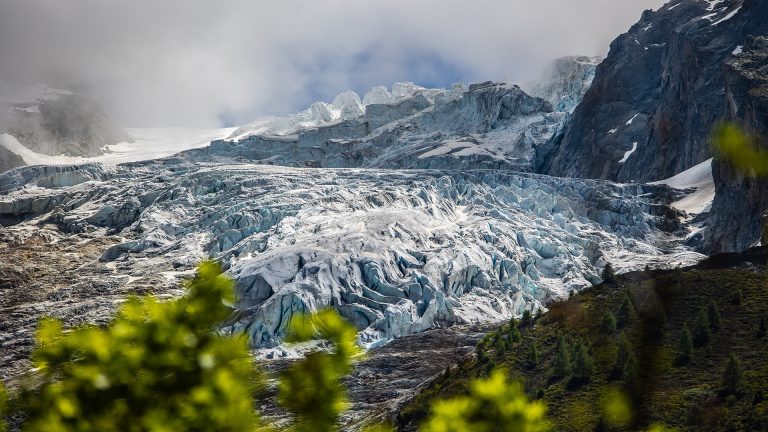What is a Summer Camp?
Summer camps are a fantastic way for children and teenagers to spend the long summer holidays and provide a supervised programme away from home where campers can learn new skills as well as building residence, self-sufficiency and independence.
For over a century camps have been a big part of summer culture in the North America, and in recent decades they have become increasingly popular in Europe and Asia too, with more parents and children enjoying the huge benefits a summer at camp can provide.
Are all summer camps ‘sleepaway’ camps?
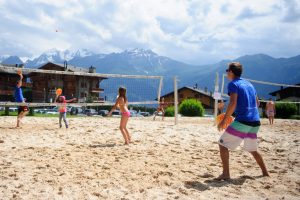
Residential, sleepaway or overnight camps are usually what people imagine when they think of summer camps, an exciting summer away from home for the kids, perhaps even in another state or country. Usually, residential camp options begin from the age of 6 or 7, and camps accept participants all the way up to age 17 and beyond, depending on the camp you are looking at.
Some camps also offer day programmes, so children can enjoy camp but still spend time with their parents in the evening. This may be a good option for parents who want to make the most of school holiday time with their children but are working during the day, those who are considering camp to provide extra activities for their children during a family holiday, or for those with younger children who may not yet be old enough for overnight camp.
What will my child do at camp?
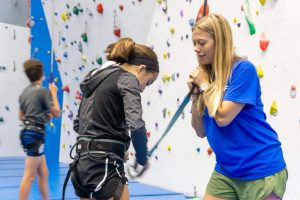
Generally, camps offer a mix of sports, activities, crafts and day trips for campers. Often summer camps have an outdoor focus, and encourage children to stay active, outdoors and try new activities they may not have had the chance to before.
The idea of a summer camp has diversified over the years and some camps now specialise in certain activities; for example some camps are more academic-focused and include language programmes, summer school, technology or science programmes, or some may offer training in specific sports such a tennis or football camp.
Other camps especially for older children may be based in the wilderness and teach older teens outdoor survival techniques, build their own camp and develop orienteering skills.
Whichever camp you choose for your child, they all have the goal of allowing children and young people to learn new skills outside of home or school, alongside their peers, and explore who they are in a supportive and safe environment.
How do I choose a summer camp
There are many options available for those looking to send their child to a summer camp, in countries all over the world, so it can be hard to know which option to choose for your child. What makes a good summer camp experience can depend a lot on your own specifications for camp, including the locations you are looking at, the activities, and the goals of summer camp for your child.
Where should I send my child to summer camp?
Firstly, you may want to take a look at the location of the camp. There are camps available in many countries around the world, with the biggest concentration in Europe, America and Canada. You may want to choose one close to home, or a camp in a country you will be visiting as a family that summer, and incorporate the camp as part of that trip.
City, beach, lake or mountains?
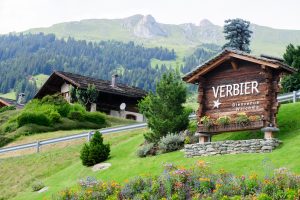
Once you know where you want to send your child, take a closer look at whereabouts the camp is based; some camps are more accessible, located in or near a town or city for example, or some are located in more rural environments, in the mountains or by a lake for example. Camps range from having a permanent purpose built campus where all activities will take place, to having a base and activities taking place in and around the local area, so take a look at the camp set up and decide what works best for you.
What type of summer camp should I choose?
The biggest part of choosing a summer camp is the programme and activities!
Camps offer many different programmes as we have mentioned, so this will play a major role in choosing the best camp for your child. You may want to send your child to a camp offering lots of outdoor adventure activities, especially if you usually live in the city, and find it hard to prise them away from their phone or tablet during term time.
You may look at a programme which includes things your child loves to do, or conversely things they haven’t tried before to enable them to broaden their horizons. Specialised camps may be an option for you if they have a particular sporting talent, or if your child plays an instrument or you are wanting them to improve their language skills.
What else should I look for in a good summer camp?
Once you’ve worked out what kind of camp you would like to send your child to and where, there are a few things you can look out for in a good camp.
Learn more about the staff
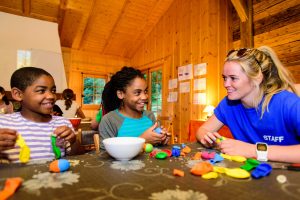
One important thing to look for is the staff to camper ratios. You want to make sure camps have small groups, and that while children are encouraged to be independent, there is always someone there to supervise them or for them to seek advice or help from. Other things to look for are that the staff are all first aid qualified, that they have experience working with children, how old they are and also be important to you if they have specific qualifications in the activities they are teaching.
Where will your child be sleeping?
Take a look at the accommodation too; camps range from traditional ‘american style’ cabins offering bunks with outhouse style facilities, to more modern cabins, large dormitories, or higher end accommodation in boarding school buildings. Does this meet your expectations for camp? What are the food options, are these healthy with enough options for your child, and catering to any dietary requirements or allergies?
Free time is important too!
How much free time is built into the camp programme? This is an important part of summer camp, especially residential camps, where kids get to bond with their new friends and relax and unwind, often the best memories are made at these times! Make sure free time is included in the camp programme.
If your child is older, you can sit down and discuss the options with them, so you are both comfortable that you are choosing the best camp option for you.
Why consider International Summer Camps?
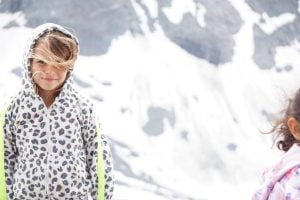
What is an international summer camp?
International camps differentiate themselves from summer camps designed for children local to the area, as they attract children from all over the world and create an international environment. Each camp session will have children and young people of different nationalities, different religions and different mother tongues, who in their normal day-to-day lives would not have the opportunity to meet and forge new friendships. This brings new benefits over other camps who are targeting those who live nearby, where campers will usually be from the same country or state, or even the same city and schools.
What advantages do international camps have?
There are huge advantages to international camps if your goal is to improve your child’s language skills. English is often used as the main language, so camp will offer an immersive experience in the English language, or you may choose to choose a camp in a country where it has a language course in one of the national languages. They will also be fully immersed into that country and culture, which can be a hugely beneficial and motivating experience when learning a language.
Who goes to an international summer camp?
Everyone! At an international camp, campers will make friends with others from a mix of backgrounds and cultures, and in doing so will expand their horizons. If they go to an international school or boarding school this may be a familiar situation to them already, but as children are visiting camp for a much shorter period, they have even more diversity.
International camps can often have the advantage that children are coming from all over the world, and therefore there aren’t big groups of friends who already know each other, and it can be easier to integrate and make friends.
What do International Summer Camps Do?
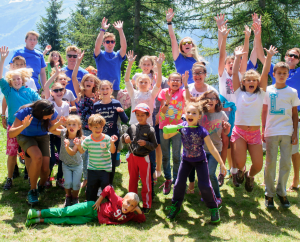
Many international summer camps have a focus on language, as that can be a big draw to sending your child abroad for their summer adventures. In Europe, international language camps will offer courses in English, French, Spanish, German or Italian amongst others. At Altitude, we offer language courses in both English and French, as well as a mountain adventure programme where students can experience activities delivered in English but without the formal language lessons.
Depending on where they are based, summer camps may differ in terms of the activities they offer, for instance they may be based in the mountains, by a lake, or on a beach! Every camp will have a different range of programmes and activities, but many involve adventure activities, sports, cultural visits and trips as well as arts, music and drama.
Best International Summer Camps
We’ve taken a look at some of the best international summer camps, based on some of the criteria you may have when choosing a camp for your child.
Best international camp for first-time campers
What to look for:
Camps which have lots of new campers each year, smaller camps, and small camper to staff ratios with experienced staff where you know your child will receive lots of attention and support. You may want to choose a camp closer to home, or a day camp if your child is younger and you want to be on hand.
Our suggestions:
Altitude International Summer Camps in Verbier, Switzerland, our own camp, is great for first-time campers, as camp sessions are small with a maximum of 50 campers, and offer a flexible programme where campers can come for the day only to experience camp for the first time, and maybe join the residential programme next year!
Best camp for older teens

What to look for:
A camp with a programme specifically for children of their age group eg.15-17 years, activities that interest your teen, camps that encourage independence, leadership, self-sufficiency. Camps that only accept older teens can be better if it’s your teen’s first time joining that camp, as they tend to avoid cliques and friendship groups if kids have been attending the same camp for a long time.
Our suggestions:
Global Youth Village : Run as a not-for-profit agency and based in the beautiful blue ridge mountains in Virginia, this camp is for those aged 15-19 who want to learn how to change the world. Their camp offers a programme of learning about leadership, community responsibility and sustainable development issues.
Teen Camp based in the state of Maine in the USA, this camp invites only teenagers aged 13-17,and has a big international cohort of campers too at around 30%. It offers a programme, actiities and schedule specifically designed for teens.
Best adventure abroad camps
What to look for:
For those looking for a real adventure or holiday, camps can offer this too! These will likely appeal to more adventurous older children and teens, but look for those with a well established programme and experience operating in the countries they are in to make sure the programme will run smoothly.
Our suggestions:
The Road Less Travelled: there’s some serious adventure packed into the programmes offered by this company, in exciting locations all over the world from the Ecuador to Norway to Tanzania, for active, adventure seeking teens.
Active Travel : Based in France, Active Travel Camp is essentially a holiday for teens aged 11-16, visiting three different locations over three weeks. Places are limited to only 45 per session, so sign up early!
Best first camp for younger children (3-5 years)
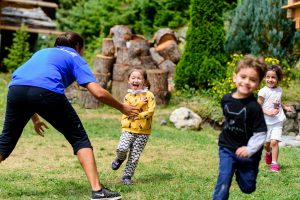
What to look for:
A camp with a programme adapted for younger children, shorter days for those under 5 years, camps that splits children by age and ability level, experienced counsellors.
Our suggestions:
Altitude Camps ‘marmot’ programme offers a half day specialised programme for those aged 3-5 years, and a day camp only option for those age 6 years before they can join the residential camp.
The International Montessori school offer a great programme of summer camps for young children in the UK, with different themed for each week, open to all children whether they are attending an international Montessori school or not.
Best camp for learning languages & speciality camps
What to look for: Depending on the age of your child you might be looking for different things; for younger children with some experience of the language, doing an activity or adventure camp and being fully immersed in the language with no formal lessons can be the best way! For older children wanting to work on their language skills, an immersive language camp including formal lessons so they can also practice their writing and reading is usually best.
Our suggestions:
Alpadia offer language camps all over Europe for ages 8-17 years, learning French, English, and German. Language lessons are 20 hours per week, plus other activities in the afternoons such as swimming, games or sports.
Village Camps offer a huge selection of specialised camp programmes including those specialised for languages, performing arts, sports leadership. Offerings depend on country, age and programme, but they are based in Europe and Canada.

